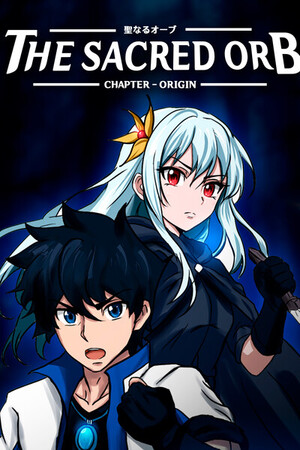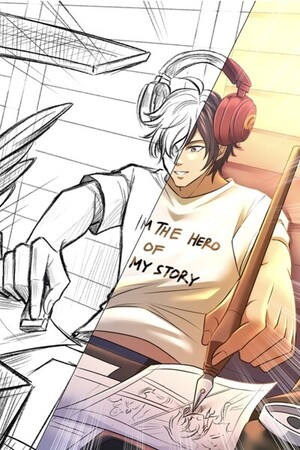Chapter 16:
Capital City
The Sacred Orb
Morning opened its eyes lazily. The whole valley lay under a low fog that clung to boots, perfumed the pines, and nipped softly at the skin. Leaves ran with dew; spiderwebs stretched between brambles like harp strings plucked by invisible fingers.
Blair and Asori walked without speaking at first, each unconsciously matching the other’s pace. The folded map—the one the merchant had stitched inside a worthless scrap—marked detours along side roads: fewer patrols, more mud.
—If we survive the Capital —Asori broke in, hood up, voice still sleepy— the first thing I want is a breakfast that isn’t hard bread.
Blair didn’t bother looking at him.
—You should be grateful you have bread.
—I am. But my teeth are going to demand compensation.
Blair pressed her lips not to smile.
—I’ll get you soup when we arrive. Assuming they don’t sell you first.
—Me or my teeth?
—You. Your teeth seem to have already signed a treaty with the bread.
The fog parted to let a shaft of light through. Asori glanced up for a heartbeat and thought—without saying it—that he wished every morning started with some absurd argument that melted the ice. The Sweet Kiss returned the thought as a warm echo: Blair felt it and lowered her hood two fingers, as if the wind needed to see her brow to blow properly.
The path narrowed until it became a throat of rock. There, where mud pooled deep and the walls chewed sound before throwing it back, three armed men appeared at once. Drab cloaks, swords re-sharpened at the wrong time, and the kind of smile used to sell what doesn’t belong to you.
—A fine day to the noble couple —sang the one in the middle, hat cocked, feather drooping—. The Brotherhood of the Road charges a very reasonable toll for crossing this pass.
Asori tensed. Not Zeknier’s soldiers; no black crow pins. Opportunists, yes, but the kind that smell of hunger.
Blair lowered her hood slowly and looked them over like fruit at someone else’s market.
—A toll for mud? —she asked, dry—. Do you charge for fog, too?
—The fog is a premium service —the hat said, without missing a beat—. Protects from stray arrows and responsibility. Now then… —he stretched out a hand, insolent—. The purse.
Blair kept her voice so flat it hurt.
—We’re in a hurry. And we have little.
—No one has “little” when they wear a nice cloak —the one on the left put in, knuckles purple from too many fights—. The purse, lady. And the boy… —he jerked his chin at Asori—. The boots.
Asori planted his feet more firmly in the mud. The air in the pass smelled of old iron, badly cured leather, nervous sweat. He remembered Eryndor’s voice: “Base state. Form before force.” He tightened his hands, loosened shoulders, sharpened breath. Four. Six.
—Not a good day to steal —he said. He knew it sounded like theater; he said it anyway.
The middle one laughed—a laugh that died on its own.
—No one leaves without paying —he nodded behind him. From the brush, a beast shuffled out on a leash. A small Megalo with bowed legs and a bony back; iron muzzle, glassy eyes. A growl rattled in its chest like it had stones for lungs.
—Relax —the hat said, proud—. It doesn’t bite… if you pay.
Blair raised a finger, patient.
—It bites. And you lie badly.
The three bandits traded looks. The creature’s muzzle trembled with a wet clatter. The bond gave a tight tug: Asori felt Blair’s fine humor go taut like a new-strung cord.
—Last offer —the knuckles smiled—. The purse and the boots. Or we teach you respect for the Brotherhood of the Road.
—Or you teach us to laugh better —Blair said—. And while you’re at it, how to leash something that doesn’t understand the word “stop.”
The hat clicked his tongue.
—Shame. Dog.
The Megalo leapt.
Asori didn’t transform. He recalled the tightrope between little bells, the scrape of rockrose on calf, the weight of water falling in four curtains. The Megalo crashed in, churning mud; Asori slipped aside just in time so the jaws snapped at air, not leg. The muzzle rasped against stone.
—Good —Blair said without warmth, one eye still on the three men—. One.
Knuckles lunged with a clumsy thrust. Form, Asori told himself. He dropped a shoulder, let the blade skim his cloak, and shoved with his forearm to shift the man’s center. The bandit tripped over his own mud and fell with creativity.
The Megalo tried again. Asori caught the pressure-change to his right, that tiny warning the wind leaves at your ear. He turned his hips, struck with a brief burst of air, and the beast stumbled, planting its forelegs in a puddle that exploded back into its eyes.
—Two —Blair noted, and this time there was a shadow of approval.
The hat advanced, attempting elegance; Blair met him with a short whip of fire, just a line that snipped his belt buckle. Sword down. Feather too.
—Charge for fog and don’t pay for scares —she said, not smiling.
The Megalo shook off mud, blind with rage. It launched straight at Asori’s chest. He tried a wide turn—too wide—and his foot plunged into a treacherous hole. Time split into panes: teeth, muzzle, the stink of rotten river, weight coming like a cart with no brake.
—Blair! —he called—not from fear, but because he was learning to ask.
The answer was exact: a needle-fine thrust of fire went through the Megalo’s joint. The creature shrieked without voice and collapsed aside, smoking inside like a hollow log. The smell of burned meat and tar filled the pass.
The bandits stepped back in unison. The hat lifted both hands; Knuckles felt for his dropped sword with his toe, never taking his eyes off the glow in Blair’s palm.
—Take your toll back —Blair said, pointing at the mud—. It’s all yours.
The Brotherhood of the Road dissolved like sugar in hot soup. They ran uphill, leaving behind the “dog” and the feather. Asori watched them go, chest heaving, cloak soaked, hands still vibrating from the jolt of what he hadn’t done and what he’d had to do.
—You could handle them without transforming —Blair said, lowering her hand and dousing the fire with a gesture like closing a book—. But you opened too wide on that turn.
—I know —he nodded, honest—. I was trying to look elegant.
—You looked alive. That’s enough —she replied, dry; and that dryness carried the weight of someone who’s seen too many elegant attempts end as epitaphs.
Asori exhaled.
—Thank you.
Blair shrugged.
—You asked well.
The Sweet Kiss thumped with shared relief, as if both had passed an exam just by remembering they were two, not two halves.
They returned to the road. The fog began to climb the hills, baring patches of sky, storm-hung valleys, birds rehearsing new melodies.
—I hate using too much force —Blair blurted, as if the sentence weighed on her—. Not because of them. Because of me. I feel like… like I lose the edge of the line. And if I lose it, I don’t know where I stop.
Asori waited two steps to answer.
—I’d rather a fire that burns a bit too much… —he searched, hesitated, jumped— …than a shadow that never lights anything.
Blair turned to look at him sideways. Her red eyes were wine backlit. The blush rose all at once.
—Don’t say things like that —she murmured, but her lip trembled and the “don’t” sounded more like a plea than a scold.
—I say them badly —he admitted—. But I mean them well.
—Idiot —she ruled, and this time the word was a blanket, not a stone.
They walked on, hearts slowly unknotting. At some point Blair unpinned the flower-gem from her brow to wipe it with the edge of her cloak; Asori held the cloth without being asked. A tiny gesture, an accord the wind recorded with a scribe’s solemnity.
The valley opened like a curtain and, far off, the Capital City showed itself. First a blurry sketch against the haze. Then the backlit cut of high walls with flags rearing in the wind. Closer, the rumble of cranes raising stands like wooden skeletons, the rhythmic hammering of a hundred hands paid by hurry, the constant throat-clearing of crowds that weren’t there yet but were already making noise.
—There it is —Blair said, no emotion in her voice and all of it hidden—. Don’t breathe too hard.
Asori couldn’t help it. His eyes widened, as if the world had decided to be more world all at once. He saw iron gates with black fittings, towers like fingers pointing at gods, districts packed inside the walls like bread in a basket. Outside, the camps of foreigners: bright tents, spice sellers who smelled of maps, minstrels practicing rhymes about heroes who didn’t yet know they’d be heroes.
In the air, besides sawdust and kitchen smoke, an electric perfume: the unmistakable scent of expectation.
—The Capital eats lives —Blair said, low—. If you’re lucky, it spits them back as names. If not, it buries them without a headstone. In here, your mistakes don’t cost bruises. They cost people.
Asori swallowed, eyes fixed.
—Then I’d better not make any —he said, and for the first time his voice sounded like a promise made not just to her, but to himself.
The Sweet Kiss answered with a strong pulse, one of those beats that line up your soul without asking. Blair touched her fingers to the gem, as if to check it was set right; in truth, she was checking that he was.
—Hood low, eyes high —she instructed, slipping into a mode half strategy, half prayer—. If someone speaks to you, answer briefly. If they shove you, give way. If you see a black crow on a pin, lower your head until you’re looking at mud. If you hear doubt in my voice, obey even if you don’t understand.
—Obeying when I don’t understand… that’s my talent —he joked.
—It wasn’t —she corrected, with the ghost of a smile—. It’s becoming one.
To the left, a ribbon seller waved blue and red strips screaming “Champion!” in badly stitched letters. To the right, two carpenters argued over the curve of a wooden arch that would be the coliseum gate. A child ran with a hoop, chased by a dog barking with a northern accent. Above it all, flags ate wind and the sky finally chose an untroubled blue.
Asori paused on the rise to take it all in. He hadn’t realized he was smiling until the smile weighed on his cheeks.
—Blair —he said, without taking his eyes off the city—. Tie?
She didn’t look at the city; she looked at him. The wind lifted a strand of hair. The flower-gem sparked.
—Tie—she answered.
And they went down the hill, the Capital opening its mouth like an ancient beast that demands stories in exchange for letting you pass. The stitched map weighed little; the warnings, much; the bond, just enough. And under all of it—beneath the mud, beneath the cloak, beneath the clumsy jokes—the taut line of two fates that had learned to walk to the same rhythm.




Please sign in to leave a comment.